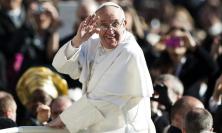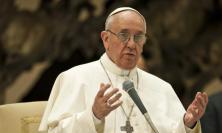In a world where the pandemic has increased inequalities and injustices, the dialogue between Pope Francis and popular movements continues. How did the fourth World Meeting of Popular Movements unfold, five years after the previous one? How did the pope address his interlocutors, and what proposals did he formulate? How on this occasion did his social teaching develop? Cardinal Michael Czerny SJ and Paolo Foglizzo explored these questions in an article for Aggiornamenti Sociali.
The World Meetings of Popular Movements (WMPM) are an apparently thin thread, but a very constant one, that runs through the pontificate of Pope Francis and constitutes one of its most innovative characteristics. They are not chance encounters but rather a strategic choice, rooted in his teaching and at the same time nourishing it. The fact that his speeches at the WMPMs are cited seven times in the encyclical Fratelli tutti is evidence for this. The title of this article, taken from the fourth meeting, expresses the key insight.
1. What are the popular movements?
The expression ‘popular movements’ can have very different resonances according to languages and cultural contexts. It indicates various forms of self- or auto-organisation that workers in the informal or popular economy set up as solutions to fundamental problems generated by their extremely precarious conditions of life. As a consequence of their informal status, these workers are statistically invisible, and they risk remaining hidden from public opinion, from the Church, from the political world and from those who design economic, social and welfare policies. Proof of this is the remarkable lack of coverage of the effects of the pandemic and lockdown with which they had to deal in every part of the world, in contrast with those who work in the formal sector. Yet we are not talking about a marginal or residual phenomenon: at the global level, the International Labour Organization estimates that 60% of workers and 80% of businesses operate in the informal sector,[1] although there are many differences between countries. For example, while informality affects 20% of US workers, in the Democratic Republic of Congo the figure is over 90%.[2] In descriptive terms, this great multitude includes street vendors, ragpickers and junk dealers, street artisans, car park attendants and window-washers, day labourers, domestic workers, caregivers, slum or squat dwellers, people living on the streets or in makeshift housing, subsistence farming communities, seasonal farm workers and labourers, landless farmers, and so on.
For these workers, informality, with the resulting lack of protection and access to rights, is not an choice, but rather the only strategy available to survive in the face of the impossibility of entering the formal sector; informality represents the consequence of exclusion.[3] Exclusion, if undergone individualistically and passively, is a condemnation; but if the excluded live it together, it can get transformed into the basis of political protagonism, often vocal, aiming at achieving two basic objectives:
- for the excluded, respect for the dignity to which all human beings are entitled, often in the traditional form of a fair wage and minimum measures of social protection; and
- for all, the overthrow of a system that is based on exclusion – a ‘throw-away culture’ in Pope Francis' lexicon – in order to build instead a society capable of including and caring for each and every one and for the common home.
2. The earlier World Meetings of Popular Movements
The WMPMs began their path with the one organised in Rome in October 2014,[4] when for the first time the key words ‘land, housing, work’ appeared in the title (tierra, techo, trabajo in Spanish, hence the expression ‘3 T's’ that Pope Francis frequently recalls in other contexts as well). This was followed by a second WMPM in Bolivia in 2015 and a third one, again in Rome, in 2016. Subsequently, the worldwide path gave way to a series of regional or continental meetings, particularly in the Americas,[5] which intersected with the preparation of the Synod for the Amazon. Following the outbreak of Covid-19, the exchange at the global level resumed with the Easter 2020 letter that Pope Francis addressed to popular movements so as to be close to them at a time when they had to cope with the pandemic and lockdowns. Six months later, on 24 October 2020, representatives of popular movements met again at the global level, using a video-conferencing platform. On this occasion, they presented their document The Economy of Francis, as a contribution to the broader initiative with the title ‘The Economy of Francesco’, scheduled for a few weeks later (19-21 November 2020). Pope Francis did not attend, and Cardinal Peter Turkson, then prefect of the Dicastery for Promoting Integral Human Development (DSSUI) offered the closing remarks.[6]
3. The fourth World Meeting of Popular Movements
This brings us to the fourth WMPM, which was convened in 2021, still by video-conference owing to pandemic-related restrictions, and in two steps. The first, held on 9 July, brought together representatives of popular movements from around the world for an exchange on the impact of the pandemic and the dilemmas facing humanity today. The richness of the exchange was condensed into a synthesis document, entitled Let's Save Humanity and the Planet, which expresses the reading of global reality from the perspective of popular movements. It proposes a new paradigm of integral human development, starting with some demands for a radical change of the system, always centred on the three key words ‘land, housing, work’: from the strengthening of public healthcare to the abolition of patents on vaccines, from the universal wage to land reform to social housing, from the protection of migrants to the fight against climate change. This document was forwarded to Pope Francis ahead of the second stage, held, again remotely, on 16 October, in which the documentary La fuerza del nosotros (‘The force of “We”’), made by the communications agency LaMachi, which specialises in social and religious issues, was also screened for the first time to testify to the commitment of popular movements for the common good during the pandemic. The second stage concluded with a video message from Pope Francis reacting to the demands expressed. While in the video-conference format, the structure of the previous WMPMs nevertheless holds: the popular movements share their experiences and, on this basis, build an analysis of the problems and some proposals for solutions; these they present to the pope, who listens and responds.
The pandemic and its concrete impact is the theme on which the fourth WMPM focused. From another point of view, however, the most significant novelty is the platform-based approach and the use of digital communication. This is not only an operational necessity: new media have entered as never before into the communication strategy prepared by the organisers (popular movements and DSSUI), together with the Dicastery for Communication and Vatican News, with the communication support of LaMachi. For example, on 16 October 2021, the fourth WMPM was the occasion of a Twitterstorm: a series of ten tweets in nine languages relayed from the pope's Twitter account the highlights of the video message. Altogether they exceeded 270 million impressions, reaching almost 50 million users. Above all, the entire course of the second stage was designed not only for the benefit of the approximately 150 representatives admitted to the video conference, but especially in view of the broadcast on the YouTube channels of popular movements, DSSUI and Vatican News, in five languages (Spanish, English, Portuguese, Italian and French, in order of number of viewers). According to data provided by LaMachi, more than 8,000 people followed the event live, and another 32,000 watched the recording in the weeks that followed until November 4: these are significantly larger numbers compared to the participants in the three meetings held in person, thanks above all to the involvement of Vatican News, whose channel registered more than 75% of the views.
4. The words of Pope Francis
In order to understand the words of Pope Francis at the fourth WMPM, it is necessary to keep in mind the circumstances in which they were pronounced and the audience to which they are directed, but also to place them within his unfolding magisterium. It is not difficult to find within the text references and connections primarily to the speeches addressed to previous WMPMs. Here, however, we would like to highlight the fact that the text is rooted in the cornerstones of his teaching. The video message is a concrete implementation of the attitude towards the poor that the programmatic document of the pontificate, the apostolic exhortation Evangelii gaudium, asks the whole Church to adopt. The reference is to §198, in particular to the second part:
This is why I want a Church which is poor and for the poor. They have much to teach us. Not only do they share in the sensus fidei, but in their difficulties they know the suffering Christ. We need to let ourselves be evangelized by them. The new evangelization is an invitation to acknowledge the saving power at work in their lives and to put them at the centre of the Church’s pilgrim way. We are called to find Christ in them, to lend our voice to their causes, but also to be their friends, to listen to them, to speak for them and to embrace the mysterious wisdom which God wishes to share with us through them.
a) Being friends of the poor
From the very first lines, the pope's affection for the popular movements shines through with great force. It is a deep bond, based on respect and devoid of any condescension. It is as a friend, an equal, that Francis speaks. For this reason, he offers what every person needs to become aware of and exercise their dignity: recognition. Being recognised, as citizens and as workers, is moreover a demand that popular movements explicitly formulate, even in the documentary La fuerza del nosotros. The social sciences tell us how powerful recognition is in terms of its potential to activate personal and community resources. The recognition offered by Pope Francis follows two different axes, both fundamental. On the one hand, it concerns the suffering of the excluded owing to the pandemic, and the injustices they are forced to suffer: the increase in poverty and inequality, the lack of social protection, the food crisis. On the other hand, the pope is careful to recognise the dedication and creativity of his listeners and thanks them ‘because you have felt the pain of others as your own. You know how to show the face of true humanity.’[7] Above all, he highlights how well they have been able to care for the common good during the pandemic: many ‘essential’ workers, who could not stop working during the lockdown and indeed faced a higher risk of contagion, belong precisely to the informal sector: ‘Like the doctors, nurses, and health workers in the trenches of healthcare, you have taken your place in the trenches of marginalized neighbourhoods.’ In summary, Pope Francis recognizes a twofold identity of those belonging to popular movements: that of victims of an unjust system, and that of protagonists of their own liberation and the building of alternatives.
b) Learning from the poor
‘I am convinced that ‘the world can be seen more clearly from the peripheries’, Francis says in the closing lines of the video message. Therefore, those who live on the margins have something to teach everyone, starting with the pope, who takes their proposals seriously: ‘These measures are present in your documents, in your speeches, and I have taken them very much into account; I have reflected on them and consulted specialists.’ These are words addressed not only to the immediate interlocutors, but to all those who will read them, especially in social contexts far from the peripheries, inviting them to do the same. The responsibility of popular movements, already affirmed in previous meetings, is not to remain silent, so that the proclamation of what is seen from the peripheries reaches the whole of society: ‘How important it is that your voice be heard, represented in all the places where decisions are made! [...] Strive to make your voice heard.’
c) Lending a voice to the poor
In the language of Evangelii gaudium, lending one's voice to the poor is the definition of advocacy. And that is what Francis does in the video message in which he himself acknowledges that he is as insistent as a beggar. In the most solemn language – ‘in the name of God’, he keeps repeating – he formulates ten demands for radical change and the overthrow of ‘what the social teaching of the Church calls structures of sin’. Several of them, such as the liberalisation of vaccine patents, debt cancellation for poor countries or the cessation of land exploitation and environmental pollution, correspond to the proposals put forward by popular movements in the document, Save Humanity and the Planet! With his own voice, the pope amplifies the words of his interlocutors.
5. Two innovative ideas
Although substantially in continuity with the speeches to earlier WMPMs, the video message addressed to the fourth contains some innovative ideas, which are worth recalling here briefly.
The first is the figure of the ‘collective Samaritan’ whom the pope, thinking of the gospel parable (Luke 10:25-37) chosen as the foundation and guide for the encyclical Fratelli tutti, applies first to the protests over the death of George Floyd and to reactions ‘against social, racial, or macho injustice’, but shortly afterwards extends to popular movements. This cue is stimulating in two respects. First, it offers us a positive reading of phenomena that are usually catalogued as ‘problems of public order’, to be managed or eventually repressed. So here too we are challenged to go beyond appearances and stereotypes, to read reality in its depth. At another level, the figure of the collective Samaritan is the seed of a notion that can serve as the positive equivalent of the structures of sin: a dynamic in which the effectiveness of the gesture of solidarity of the individual, perhaps humble and negligible, comes from participating in a collective construction, which shapes culture by directing the evolution of society towards the good (just as the structures of sin do in the opposite direction).
The second point concerns the measures that the pope proposes in the concluding paragraph and, given his attention to concreteness and reality, they could not be missing. Both point to the problem of unemployment, thus confirming the centrality of work in Pope Francis's concerns.[8] One is the reduction of working hours; the other, which has not failed to attract some heightened media attention, is the proposal of the so-called ‘minimum or universal basic income’, already mentioned in the afore-mentioned 2020 Easter letter. The expression used is the technical one mentioning basic income, but the proposal can only be understood as embracing the idea, expressed by Francis many times over the years, that work alone marks and fills people with dignity.[9] Moreover, addressing a very similar audience just two days earlier, he had said: ‘Some have made me say things I do not support: that I propose a life without effort, or that I despise the culture of work. [...] Work expresses and nourishes the dignity of the human being [...]. For this reason, subsidies can only be a temporary help. We cannot live on subsidies’.[10] These words represent the key to interpreting correctly the reference to universal basic income as well.
6. Dream and prophecy
Francis is aware that to a disenchanted ear his words will sound unrealistic, but he strongly asserts the need to dream: ‘Let us dream together, dream among yourselves, dream with others.’ He again uses a category, that of the dream, on which he had already based Querida Amazonia and Fratelli tutti. It is certainly not a matter of proposing a fantastical evasion, out of touch with the concreteness of daily life. Here, the dream is a vision capable of orienting and ‘setting us in motion’. In this sense, it is very close to prophecy, equally considered unattainable and therefore just as derided.
In many ways, it seems legitimate to consider prophecy as the literary genre of this video message and of the speeches to the previous WMPMs. Prophets cannot fail to speak their word to a world where it appears poor and weak, with no other strength than that of its truth. Precisely for this reason, however, it is a word that challenges us, like the face of the poor and excluded whom we meet in the streets of our cities, intent on carrying out their humble and unappreciated tasks from which we all benefit, and who insist, every now and then, legitimately and understandably, on shouting out their protest.
Cardinal Michael Czerny SJ is Prefect of the Dicastery for the Service of Integral Human Development; and Paolo Foglizzo is Editor of Aggiornamenti Sociali.
This article was originally published in Aggiornamenti Sociali 73.1 (January 2022).
A timeline of the World Meeting of Popular Movements:
WMPM I: 27-29 October 2014, Rome.
WMPM II: 7-9 July, 2015, Santa Cruz de la Sierra (Bolivia).
WMPM III: 2-5 November 2016, Rome.
World Meeting with the Vatican: 24 October 2020, by video-conference.
WMPM IV: 9 July and 16 October 2021, by video-conference.
Other resources
Speeches and messages of Pope Francis to popular movements (available at www.vatican.va):
- Video Message on the occasion of the fourth World Meeting of Popular Movements, 16 October 2021.
- Letter to the Popular Movements, 12 April 2020.
- Message on the occasion of the Meeting of Popular Movements in Modesto, California (16-19 February 2017), 10 February 2017.
- Address to participants in the third World Meeting of Popular Movements, 5 November 2016.
- Address to the second World Meeting of Popular Movements, 9 July 2015.
- Address to the participants in the World Meeting of Popular Movements, 28 October 2014.
Other texts and speeches of Pope Francis (available at www.vatican.va):
- Videomensaje con motivo del 57° Coloquio de la Fundación Idea, 14 October 2021.
- Video Message to participants in the International Conference ‘A politics rooted in the people,’ 16 April 2021.
- Encyclical letter, Fratelli Tutti, 3 October 2021.
- Post-synodal apostolic exhortation, Querida Amazonia, 2 February 2020.
- Letter to the participants in the International Conference ‘From Populorum progressio to Laudato si',’ 23 November 2017.
- Apostolic exhortation Evangelii gaudium, 24 November 2013.
Documents and materials produced by popular movements (available at https://movpop.org):
- La fuerza del nosotros, documentary, 16 October 2021.
- Save humanity and the planet!, synthesis document, WMPM IV, 15 October 2021.
- The Economy of Francis, 24 October 2020.
[1] Cf. International Labour Organization, ‘Informal economy’, at www.ilo.org/global/topics/employment-promotion/informal-economy/lang--en/index.htm
[2] Dembinski, P. ‘Humanity at work’, in Alonso Alasino, I., Foglizzo, P., Hagemann, H., and Warrian, P. (eds.), Care is Work, Work is Care, Report of ‘The Future of Work – Labour after Laudato si’’ Project (Geneva: ICMC, 2020), 119-124; available at https://futureofwork-labourafterlaudatosi.net
[3] Deneulin, S. and Murga, M., The Power of Organizing. The Story of the Confederation of the Popular Economy Workers to Recover Dignified Work (Buenos Aires: CTEP, 2014).
[4] Cf. Czerny, M. and Foglizzo, P., ‘The Strength of the Excluded: World Meeting of Popular Movements at the Vatican’, in Thinking Faith, 29 January 2015: www.thinkingfaith.org/articles/strength-excluded-world-meeting-popular-movements-vatican
[5] For example, the one held in Modesto (California) in February 2017, to which Pope Francis addressed a Message.
[6] Cf. San Martín, I., ‘Popular Movements Meeting Supported by Pope Francis Presents Proposals for New Economic System’, in The Tablet, 26 October 2020: https://thetablet.org/popular-movements-meeting-supported-by-pope-francis-presents-proposals-for-new-economic-system/
[7] Unless otherwise indicated, quotes from here on are from the video message to the fourth WMPM.
[8] Costa G. and Foglizzo P. (eds.), Il lavoro è dignità. Le parole di Papa Francesco (Roma: Ediesse, 2018).
[9] For instance, cf. Pope Francis, General Audience, 1 May 2013.
[10] Videomensaje con motivo del 57° Coloquio de la Fundación Idea; our translation.






